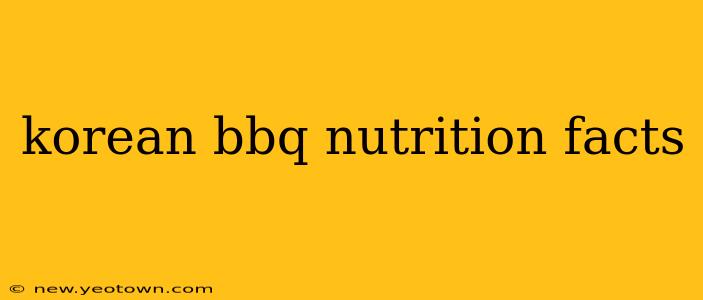Korean BBQ, with its sizzling meats, vibrant banchan (side dishes), and flavorful sauces, is a culinary adventure that tantalizes the taste buds. But beyond the deliciousness, lies a question many ask: what are the nutritional facts behind this beloved cuisine? Let's embark on a flavorful journey to uncover the nutritional landscape of Korean BBQ.
What are the calories in Korean BBQ?
This is tricky, as the calorie count in Korean BBQ varies wildly depending on your choices. A single serving of bulgogi (marinated beef) can range from 200 to 400 calories, depending on the cut of beef and the amount of marinade. However, a full Korean BBQ meal, including various meats, rice, noodles, and generous portions of banchan, can easily exceed 1000 calories. The key is moderation and mindful selection.
Is Korean BBQ healthy?
The healthfulness of Korean BBQ hinges heavily on the choices you make. Leaner cuts of meat, like sirloin or chicken breast, are healthier options compared to fatty cuts like brisket or pork belly. The abundance of vegetables in the banchan significantly boosts the nutritional profile, providing essential vitamins and minerals. However, the high fat and sodium content in some meats and sauces can pose a challenge for those watching their intake. The balance is key; opting for a variety of colorful vegetables and lean proteins will greatly improve the nutritional value of your meal.
What are the nutritional benefits of Korean BBQ?
While not strictly a "health food," Korean BBQ can offer several nutritional benefits when prepared thoughtfully. The banchan often includes nutrient-rich vegetables like kimchi (fermented cabbage, rich in probiotics), spinach, seasoned bean sprouts, and various other options, supplying vitamins, minerals, and fiber. Lean proteins provide essential amino acids for muscle building and repair. The overall experience also brings social and emotional benefits, fostering connection and enjoyment.
How many carbs are in Korean BBQ?
The carbohydrate content in Korean BBQ largely depends on your side dishes. Rice, noodles, and some banchan contribute significantly to the carb count. A single bowl of rice can add 200-300 calories and a substantial amount of carbohydrates to your meal. Opting for smaller portions of rice or choosing alternative grains like brown rice can help manage your carbohydrate intake.
How much fat is in Korean BBQ?
The fat content in Korean BBQ can be quite high, particularly when you include fatty cuts of meat. Marbling in beef, for example, adds significantly to the fat content. The amount of oil used in cooking also plays a role. Choosing leaner cuts and reducing the amount of oil used during grilling can help keep your fat intake in check. Grilling methods, such as using a non-stick grill, can also limit the amount of additional fat added during the cooking process.
What are the best healthy options for Korean BBQ?
Prioritizing lean meats like chicken breast, seafood, or lean cuts of beef is a great start. Load up on the colorful, nutrient-packed banchan. Don’t shy away from those vibrant vegetables! Choose brown rice over white rice for added fiber, and be mindful of your sauce intake. Moderation is key – enjoy the experience without overdoing any particular item.
Conclusion: Navigating the Nutritional Landscape of Korean BBQ
Korean BBQ offers a delightful culinary experience, but mindful choices are essential for balancing enjoyment with health. By selecting lean meats, focusing on the diverse vegetable offerings, and practicing moderation, you can create a nutritious and satisfying Korean BBQ experience. Remember, balance is key to enjoying this delicious cuisine without compromising your health goals.

